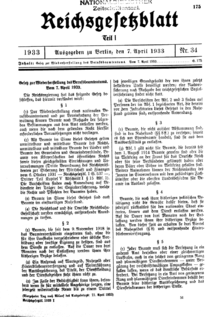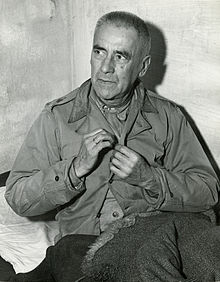Закон о восстановлении профессиональной государственной службы



Закон о восстановлении профессиональной государственной службы ( немецкий язык : Гесетц Зур Видерхерстелнг де Беруфсбейментумс , сокращенный до Berufsbeamtengesetz ), также известный как Закон о гражданской службе , Закон о восстановлении гражданской службы и закон для восстановления государственной службы , был введен Нацистский режим в Германии 7 апреля 1933 года. Этот закон, последовавший за Адольфа Гитлера подъемом к власти к двум месяцам и обнародованию акта , который стал одним из самых ранних случаев антисемитского и расистского законодательства в Германии Полем
Основная цель закона состояла в том, чтобы установить «национальную» и «профессиональную» государственную службу путем отклонения определенных групп живых государственных служащих. Лица неарийского происхождения , особенно те, кто из еврейского происхождения, были вынуждены уйти в отставку, в то время как члены Коммунистической партии или аффилированных организаций должны были быть прекращены с их позиций. Кроме того, закон запретил евреям, неарийцам и политическим противникам удерживать должности в качестве учителей, профессоров, судей или внутри правительства. Его охват распространялся на другие профессии, такие как юристы, врачи, налоговые консультанты, музыканты и нотариусы. Первоначально закон требовал увольнения всех неарийских государственных служащих, но последующие поправки были введены в освобожденные ветераны Первой мировой войны , лица, служащие с августа 1914 года, и тех, кто потерял членов семьи в войне.
This law represented a significant turning point for German Jewry, prompting notable figures such as Albert Einstein to resign and emigrate prior to being forcibly expelled. Another provision aimed to remove personnel deemed unreliable due to their political beliefs. The legislation defined Aryan lineage and established a distinction between Aryans and non-Aryans. It also included provisions for compulsory retirement and the requirement of providing evidence of Aryan ancestry. A series of related ordinances were issued to implement the law and introduce further regulations.
Articles of the law
[edit]Article 1 of the Law claimed that in order to re-establish a "national" and "professional" civil service, members of certain groups of tenured civil servants were to be dismissed.[1] Civil servants who were not of Aryan descent were to retire. Non-Aryans were defined as someone descended from non-Aryans, especially those descended from Jewish parents, or grandparents.[2] Members of the Communist Party, or any related or associated organisation were to be dismissed.[3] This meant that Jews, other non-Aryans, and political opponents could not serve as teachers, professors, judges, or other government positions. Shortly afterwards, a similar law was passed concerning lawyers, doctors, tax consultants, musicians, and notaries.
As the law was first drafted by the Interior Minister Wilhelm Frick, all those of "non-Aryan descent" were to be fired immediately at the Reich, Länder and municipal levels of government. However, the President of Germany, Paul von Hindenburg objected to the bill until it had been amended to exclude three classes of civil servants from the ban:
- World War I veterans who had served at the front
- those who had been in the civil service continuously since 1 August 1914 (i.e. since the start of the War)
- those who lost a father or son in combat in the Great War[4]
Hitler agreed to these amendments and the bill was signed into law on 7 April 1933.[5] In practice, the amendments excluded most Jewish civil servants; after Hindenburg's death in 1934, the amendments were superseded completely by the Nuremberg Laws. Nonetheless, passage of the law was a crucial turning point in the history of German Jewry, for it marked the first time since the last German Jews had been emancipated in 1871 that an anti-Semitic law had been passed in Germany. In one particularly notable example of the law's effect, Albert Einstein resigned his position at the Prussian Academy of Sciences and emigrated to the United States before he could be expelled.[citation needed]
Article 4 of the Law ("Civil servants who, after their previous political activities, cannot guarantee that they will always stand up for the national state without reservation[…].") had the intention to remove all personnel that, because of their political views, could not be relied upon by the Party to execute its wishes (Gleichschaltung). This Article 4 affected all Germans irrespective of their "racial" origins.
Content
[edit]Following the decree, Albert Gorter redefined the term 'Aryan' in the Aryan paragraph as:
The Aryans (also Indo-Germans, Japhetiten) are one of the three branches of the Caucasian (white race); they are divided into the western (European), that is the German, Roman, Greek, Slav, Lett, Celt [and] Albanesen, and the eastern (Asiatic) Aryans, that is the Indian (Hindu) and Iranian (Persian, Afghan, Armenian, Georgian, Kurd). Non-Aryans are therefore: 1. the members of two other races, namely the Mongolian (yellow) and the Negroid (black) races; 2. the members of the two other branches of the Caucasian race, namely the Semites (Jews, Arabs) and Hamites (Berbers). The Finns and the Hungarians belong to the Mongoloid race; but it is hardly the intention of the law to treat them as non-Aryans. Thus … the non-Jewish members of the European Volk are Aryans...[6]
However, this definition was unacceptable because it included non-European races.[6] Achim Gercke later redefined this unacceptable definition as the one already used by the Expert Advisor for Population and Racial Policy which stated "An Aryan is one who is tribally related to German blood. An Aryan is the descendant of a Volk domiciled in Europe in a closed tribal settlement since recorded history."[6] This new definition allowed the Civil Service Law to differentiate between 'Aryans' and 'non-Aryans'. However, the quantity of how much Jewish blood an individual was allowed to have until it was considered to damage the German Volk remained untenable.[7]
(The following is translated from the German version of this page.) Political opponents of national socialism ("Officials who, on account of their past political activities cannot guarantee that they have always acted wholeheartedly for the national state") should either be forced into retirement or let go from their jobs.
Moreover, civil servants should be let go if they had started their jobs after 1918 and were now unable to demonstrate that they had acquired all the training necessary for their careers. These people were called "membership book officials (Parteibuch-Beamte)" in the language of National Socialist propaganda.
According to § 3 (1) of the "First Ordinance for the accomplishment of the Law for the Restoration of the Professional Civil Service, the first definition of a Jew was defined as:
A person is to be considered non-Aryan if he is descended from non-Aryan, and especially from Jewish parents or grandparents. It is sufficient if one parent or grandparent is non-Aryan. This is to be assumed in particular where one parent or grandparent was of the Jewish religion.[8][9]
They could be let go or prematurely forced into retirement. According to § 3 (2), however, "non-Aryan" officials should be left in their positions if they had occupied those positions since a date before August 1914. Those Jewish civil servants who had a son or father who had been killed in the First World War were also spared from being sacked. This loophole also applied to "Frontkämpfer" (Front-line soldiers) (see Frontkämpferprivileg). All persons in the civil service would have to be able to produce the Ariernachweis (proof of Aryan ancestry) in order to prove that they had no ancestors of the Jewish faith. The loophole was closed by the 1935 Nuremberg Laws. Jewish civil servants still holding their posts were given notice by 31 December 1935 at the latest.
According to § 6 of the law, civil servants could be forced into retirement without cause "for the simplification of administration". The vacant positions created by this action were not to be refilled.
In rapid succession numerous regulations were dispensed with, as well as many employees and labourers in civil service as well as in the Reichsbank.
Pensions were not allowed for all groups of people forced into the ranks of pensioners by this law. The guaranteed old-age pension was reduced in 1938 by the "Siebente Verordnung zum Reichsbürgergesetz".
On 1 September 1933, Frick issued the second supplementary decree of the law in attempt to define the terms "Aryan" and "non-Aryan":
Определяя концепцию арийского происхождения в соответствии с разделом 3 Закона для восстановления государственной службы, это не религия, которая является решающей, а скорее происхождение, расой, кровью. В частности, не только те, из которых родитель или бабушка и дедушка принадлежали еврейской религии, которые не являются неарийскими ... Таким образом, закон ни в коем случае не исключает возможность неарийского происхождения, даже если ни один из родителей или Бабушка и дедушка принадлежали еврейской религии, в случае, если неарийское происхождение может быть установлено другими способами. [ 10 ]
Связанные постановления
[ редактировать ]- 11 апреля 1933 г. - Первое постановление о реализации закона для восстановления профессиональной государственной службы [ 11 ]
- 25 апреля 1933 г. - Закон против переполнения немецких школ и университетов [ 12 ]
- 6 мая 1933 г. - Третье постановление о реализации закона для восстановления профессиональной государственной службы [ 13 ]
- 21 января 1935 г. - Закон о выходе на пенсию и передаче профессоров в результате реорганизации немецкой системы высшего образования [ 14 ]
Смотрите также
[ редактировать ]- Арийский сертификат Анентафель , Аненпапс, чтобы доказать арийский происхождение
- Расовая политика нацистской Германии
Примечания
[ редактировать ]- ^ Нацистская Германия Sourcebook: антология текстов, Эд Родерик Степельберг, Салли А. Уинкл, Routledge, 15 апреля 2013 г., Статья 1 Первое регулирование по управлению законом для восстановления профессиональной государственной службы
- ^ Нацистская Германия Sourcebook: антология текстов , Эд Родерик Степельберг, Салли А. Винкл, Routledge, 2013, статья 3.12b Первое правила для управления законом для восстановления профессиональной государственной службы [ ISBN отсутствует ]
- ^ Нацистская Германия Sourcebook: антология текстов , Эд Родерик Степельберг, Салли А. Уинкл, Routledge, 2013, статья 2 Первое правила для управления законом для восстановления профессиональной государственной службы
- ^ См. Закон о восстановлении профессиональной государственной службы для исключений.
- ^ В соответствии с актуальным актом 1933 года ни согласие Рейхстага , ни подписи президента Республики больше не требовались для обнародования закона . Таким образом, поправка к Гинденбургу была вопросом политической целесообразности, а не юридической необходимости.
- ^ Подпрыгнуть до: а беременный в Ehrenreich 2007 , p. 10
- ^ Ehrenreich 2007 , p. 11
- ^ Лени Яхил, Холокост: судьба европейского еврейства, 1932–1945 , с. 65 [ ISBN отсутствует ]
- ^ Хотя закон определил еврея как человека, у которого даже один еврейский бабушка и дедушка «не», то, как законы Нюрнберга 1935 года рассматривали таких людей, как «четверть еврей (« Vierteljuden »).
- ^ Брайан Марк Ригг, еврейские солдаты Гитлера: невыразимая история нацистских расовых законов и людей еврейского происхождения в немецких военных , с. 79 [ ISBN отсутствует ]
- ^ Hentschel, 1996, 25–26. Документ № 8.
- ^ Hentschel, 1996, 34–36. Документ № 12.
- ^ Hentschel, 1996, 46–49. Документ № 17.
- ^ Hentschel, 1996, 96–97. Документ № 36.
Ссылки
[ редактировать ]- Эренрейх, Эрик (2007). Нацистское наследственное доказательство: генеалогия, расовая наука и окончательное решение . Блумингтон: издательство Университета Индианы. ISBN 978-0253349453 .
- Бауэр, Иегуда : история Холокоста . Нью -Йорк: Ф. Уоттс, 1982. ISBN 0531098621 .
- Фридландер, Саул : Нацистская Германия и том евреев. Том 1. Годы преследования, 1933–1939 . Нью -Йорк: HarperCollins, 1997 ISBN 0060190426 .
- Хеншель, Клаус, редактор и Энн М. Хеншель, редактор и переводчик: физика и национальный социализм: антология первичных источников . Birkhäuser: Базель, Берлин, Бостон, 1996. ISBN 0817653120 .
Внешние ссылки
[ редактировать ]- Робертсон, Струан. «Еврейская община в Гамбурге 1860–1943» . Получено 25 сентября 2005 года.
- Закон о восстановлении профессиональной государственной службы, 7 апреля 1933 года на английском языке
- Немецкий оригинал текста
- Профессиональные чиновники действуют из немецкой Википедии. Получено 25 сентября 2005 года.